Best Nutrition Books of the Year
These aren’t the year’s bestselling nutrition books, but they should be. Instead of hype and hyperbole, these 5 books serve up a heaping helping of common sense and sanity, which is why they should feel right at home here.
Monica Reinagel, MS, LD/N, CNS
Listen
Best Nutrition Books of the Year
I’m always a little discouraged to see lists of the bestselling books about food and nutrition. So often, the books that get the most attention are the ones that make the most sensational claims, or that reduce complex science to oversimplified generalizations, or that abandon science altogether. Although they often dominate the airwaves, they rarely contribute to a healthier, wiser, or more sustainable relationship with food.
So this week, I want to shine the light on 5 books that may not have made many bestseller lists but are really worthy of your attention. .
Calling All Myth-Busters!
The first two books on my list are near and dear to my heart because they tackle pervasive myths and memes about nutrition and shine the welcome light of reason on all kinds of nonsense.
Book #1: Unmasking Superfoods: The Truth and Hype About Acai, Chia, Quinoa, Blueberries and More, by Jennifer Sygo, RD
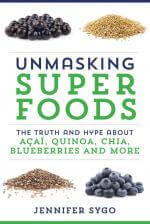
If you love a good debunking as much as I do, Sygo’s book deserves a place on your bookshelf.
Book #2: The Diet Cult: The Surprising Fallacy at the Core of Nutrition Fads and a Guide to Healthy Eating for the Rest of US, by Matt Fitzgerald
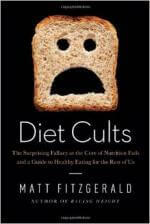
See also: The Diet Secret That Will Blow Your Mind
As Fitzgerald argues, “There is no such thing as the healthiest diet. To the contrary, science has established quite definitively that humans are able to thrive equally well on a variety of diets. Adaptability is the hallmark of man as eater. For us, many diets are good while none is perfect.”
Remind you of anyone you know? Fitzgerald is singing my tune here. He’s even coined the term “healthy eating agnostic” to describe what thinks of as a sensible approach. Healthy eating agnostics “eat everything, but they eat a lot more of the healthiest foods (such as vegetables) than they do of the least healthy foods (such as soft drinks).”
Fitzgerald has even assembled a sort of ranking system to help guide you toward the healthier end of the spectrum – although you could probably put together your own list based on what you already know. Although this approach is going to be most effective for someone who also exercises regularly and isn’t dealing with specific medical issues such as pre-diabetes, it’s such a welcome infusion of anti-dogma.
Are We Done Dieting Now?
The next two books on my list are both by friends of mine, each of whom has made a eloquent argument for why dieting is the worst possible way to go about losing weight.
Book #3: The Diet Fix: Why Diets Fail and How to Make Yours Work, by Yoni Freedhoff, MD
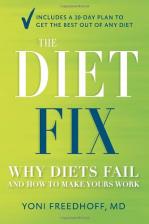
Editors and publishers love “programs” and they are loathe to ever publish a weight loss book that doesn’t include one. Accordingly, Yoni’s book includes a 10-day reset program that can be used with any diet. During these 10 days, you are encouraged to cook, indulge, and eat out – but also to think, exercise, and set goals. It’s a recovery program for chronic dieters – and it’s not a minute too soon. We have become a nation of chronic dieters and it’s obviously not working for us.
They say that insanity is doing the same thing over and over again and expecting different results. This book offers a big dose of sanity, as does the next book on my list.
Book #4: Foodist: Using Real Food and Real Science to Lose Weight Without Dieting, by Darya Pino, PhD.
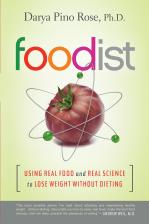
As you’ve heard me say before, the problem with diets is that when you reach your goal, you stop dieting. The great thing about Darya’s approach is that it’s not a diet, it’s an attitude and a set of strategies that you cultivate for life. It’s also a really entertaining book. I think you’ll enjoy it.
The Ethicurean Option
The last book on my list addresses one of my personal nutrition dilemmas. From a purely biological perspective, it seems clear that the ideal human diet would include some animal protein. And yet many people, including me, have ethical issues with the way that we raise animals for food these days. I try to restrict my consumption of animal foods to those that have been raised and slaughtered humanely. But because it can be so difficult to determine how an animal was handled before it came to your plate, I end up eating vegetarian most of the time.
That’s why I’m grateful for…
Book #5: The Carnivore’s Manifesto: Eating Well, Eating Responsibly, Eating Meat, by Patrick Martins
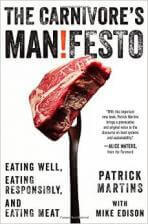
Unfortunately, doing the right thing also costs more…you won’t find humanely raised beef on any dollar menus. That’s OK with me because I don’t really want to eat meat more than 3-4 times a month. This book makes it easier to do that in good conscience.
Your Nominations for Best Books?
If you came across another great book on health and nutrition this year, feel free to post it in the comments section below or on the Nutrition Diva Facebook page.
Check out more tips on healthy eating without deprivation at quickanddirtytips.com/health-fitness/healthy-eating.

